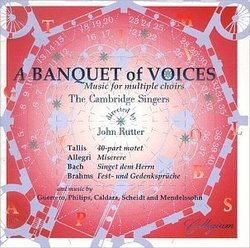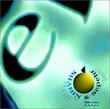| All Artists: Thomas Tallis, Gregorio Allegri, Johann Sebastian Bach, Johannes Brahms, Antonio Caldara, Francisco Guerrero, Felix Mendelssohn, Peter Philips, John Rutter, Cambridge Singers Title: A Banquet of Voices: Music for Multiple Choirs Members Wishing: 0 Total Copies: 0 Label: Collegium Release Date: 2/29/2000 Genres: Folk, Classical Styles: Opera & Classical Vocal, Historical Periods, Baroque (c.1600-1750) Number of Discs: 1 SwapaCD Credits: 1 UPC: 040888012320 |
Search - Thomas Tallis, Gregorio Allegri, Johann Sebastian Bach :: A Banquet of Voices: Music for Multiple Choirs
 | Thomas Tallis, Gregorio Allegri, Johann Sebastian Bach A Banquet of Voices: Music for Multiple Choirs Genres: Folk, Classical
Most recordings of "music for multiple choirs" focus on Gabrieli and perhaps include Allegri's famous Miserere. Here, we get a beautiful Miserere performance, but there's no Gabrieli. Instead, we have rarely performed work... more » |
Larger Image |
CD DetailsSynopsis
Amazon.com Most recordings of "music for multiple choirs" focus on Gabrieli and perhaps include Allegri's famous Miserere. Here, we get a beautiful Miserere performance, but there's no Gabrieli. Instead, we have rarely performed works by Peter Philips, Brahms, and Mendelssohn, and Bach's motet Singet dem Herrn. It's a terrific program, sung to the usual Cambridge Singers standard--with complementary sound that enhances the multiple choir effect. --David Vernier Similar CDs
Similarly Requested CDs
|
CD ReviewsNice program...but somewhat lacking compared to others johnmonteverdi | At my desk in Makati, Philippines | 10/06/2000 (4 out of 5 stars) "The Cambridge Singers have always been one of my favorite choral groups. Here they present a very unique and ambitious program, giving adequate performances of polychoral music.Few disks will ever contain Allegri's Miserere and Tallis' Spem in Alium together...but how about this, Bach's Singet dem Herr motet comes along! Other gems include Mendelssohn's Heilig. Again, a very compelling compilation!Why didn't I give this album 5 stars? Being a sort of choral freak, I get to collect hundreds of choral recordings...and I think all of the major works here have been performed much better by other groups. Just compare the Miserere here to that of Trinity College (another straight tone Cambridge choir). Or check out the reading of the Bach motet of the RIAS Kammerchor and then you'll see what I mean. The performances here are not the best that you'll find. Sure the choir sounds as crisp as ever but you realized it lacks something once you here other superb renditions...Still, this is a compelling survey. Not to be missed by Cambridge fans and enthusiasts of the choral genre." A voice teacher and early music fan George Peabody | Planet Earth | 03/25/2007 (4 out of 5 stars) "IS RUTTER'S MISSION TO BREAK WITH TRADITION WHEN HE DOES NOT INCLUDE FALSETTOS IN HIS LINE-UP? I CALL IT SEDITION!!!!
This recording is a celebration and an exploration, of some of the great wealth of choral music written for multiple choirs. For centuries composers have loved to make use of the spatial effects obtainable from placing two or more choirs antiphonally, and some of the most sumptuous and thrilling sounds in choral literature have resulted. Polychoral music takes many forms. Common to most of them is the idea of sounds coming from different points in space. There is no theoretical limit to the number of independent voice-parts that a composer can write for, though beyond a certain number the practical problems of co-ordination in performance and maintaining clarity of sound become unmanageable. More voices do not,of course, make for better music, yet in the hands of a master such as Thomas Tallis, forty voices are not an extravgance: he uses them to make extraordinary, wonderful, and at times almost overwhelming sounds that could not have been created in any other way. Now, here are the reasons that this, to my thinking, is not a five-star album. Firstly, if you are going to perform the music of Guerrero, Allegri, Caldara, Bach and Tallis, you MUST not have female sopranos and altos, because their music was written in an era when females were not in choirs (for the most part). It actually offends me when I hear Allegri's lovely 'Miserere' performed with only one lone male alto. As for the Brahhms and the Mendelssohn, its quite proper to use the standard SATB choir minus the male altos and sopranos. There is something lack-luster about this entire disc, and yet it is not ill-performed; nothing Rutter ever does is done poorly, so I apologize if I am over zealous in my critique." |

 Track Listings (14) - Disc #1
Track Listings (14) - Disc #1








